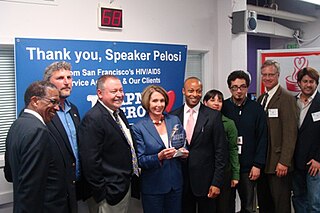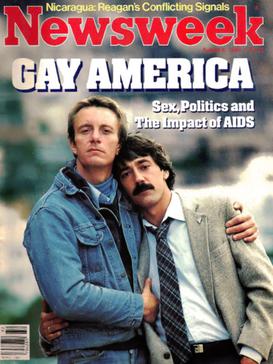
The AIDS epidemic, caused by HIV, found its way to the United States between the 1970s and 1980s, but was first noticed after doctors discovered clusters of Kaposi's sarcoma and pneumocystis pneumonia in homosexual men in Los Angeles, New York City, and San Francisco in 1981. Treatment of HIV/AIDS is primarily via the use of multiple antiretroviral drugs, and education programs to help people avoid infection.

AIDS Coalition to Unleash Power is an international, grassroots political group working to end the AIDS pandemic. The group works to improve the lives of people with AIDS through direct action, medical research, treatment and advocacy, and working to change legislation and public policies.

The GMHC is a New York City–based non-profit, volunteer-supported and community-based AIDS service organization whose mission statement is to "end the AIDS epidemic and uplift the lives of all affected." Founded in 1982, it is often billed as the "world's oldest AIDS service organization," as well as the "nation's oldest HIV/AIDS service organization."

Project Open Hand is a California nonprofit organization that provides medically tailored meals and groceries to elderly and homebound people in San Francisco and Alameda County. Founded in 1985 to deliver meals to people with AIDS, it also took over food banks in the 1980s and 1990s and in the 21st century extended its services to include people with other acute and chronic conditions and to serve lunches to seniors. Its headquarters are at 730 Polk Street in the Tenderloin; its CEO is Paul Hepfer.
Lani Kaʻahumanu is a Native Hawaiian bisexual and feminist writer and activist. She is openly bisexual and writes and speaks on sexuality issues frequently. She serves on the editorial board of the Journal of Bisexuality. She is also working on the books My Grassroots Are Showing: Stories, Speeches, and Special Affections and Passing For Other: Primal Creams and Forbidden Dreams – Poetry, Prose, and Performance Pieces. In 1974, she divorced her husband and moved to San Francisco, where she originally came out as a lesbian. She was a student leader in the nascent San Francisco State Women Studies Department, and in 1979, she became the first person in her family to graduate from college. Kaʻahumanu realized she was bisexual and came out again in 1980.

Robert Boyle "Bobbi" Campbell Jr. was a public health nurse and an early United States AIDS activist. In September 1981, Campbell became the 16th person in San Francisco to be diagnosed with Kaposi's sarcoma, when that was a proxy for an AIDS diagnosis. He was the first to come out publicly as a person with what came to be known as AIDS, writing a regular column in the San Francisco Sentinel, syndicated nationwide, describing his experiences and posting photos of his KS lesions to help other San Franciscans know what to look for, as well as helping write the first San Francisco safer sex manual.

AIDES is a French community-based non-profit organisation that was founded in 1984 by Daniel Defert, following the death, from HIV/AIDS, of his partner Michel Foucault. The name is a play on "aides" and the English acronym "AIDS".
The AIDS Show is a 1984 American collaboratively written theatre piece created to address the social impact HIV/AIDS had on the LGBTQ community. A 1986 documentary film of the same name was developed by producer and writer Rob Epstein and filmmaker Peter Adair.

And the Band Played On is a 1993 American television film docudrama directed by Roger Spottiswoode. The teleplay by Arnold Schulman is based on the best-selling 1987 non-fiction book And the Band Played On: Politics, People, and the AIDS Epidemic by Randy Shilts, and is noteworthy for featuring both a vast historical scope, as well as an exceptionally sprawling cast.

STOP AIDS Project (SAP) was a nonprofit organization which worked to prevent transmission of HIV among all gay, bisexual, and trans men in San Francisco, California, through multicultural, community based organising.

HIV/AIDS was first detected in Canada in 1982. In 2018, there were approximately 62,050 people living with HIV/AIDS in Canada. It was estimated that 8,300 people were living with undiagnosed HIV in 2018. Mortality has decreased due to medical advances against HIV/AIDS, especially highly active antiretroviral therapy (HAART).
The Naz Foundation (India) Trust is a non-governmental organisation (NGO) in that country that works on HIV/AIDS and sexual health. It is based in the Indian capital of New Delhi.
The UCSF Alliance Health Project (AHP), formerly the AIDS Health Project, is a 501(c)(3) nonprofit organization that provides mental health and wellness services for the HIV/AIDS and LGBTQ communities in San Francisco. It is part of the University of California, San Francisco Department of Psychiatry. In addition to direct service to individuals, it also undertakes HIV prevention and LGBTQ mental health research and educates mental health and health care providers about best practices.
galck+, formerly The Gay and Lesbian Coalition of Kenya (GALCK), is the national Sexual Orientation Gender Identity and Expression (SOGIE) umbrella body, representing LGBTQ+ voices across Kenya.

The San Francisco AIDS Foundation (SFAF) is a nonprofit organization dedicated to providing services for people with HIV/AIDS, with a mission to end the AIDS epidemic in the United States. They were founded in 1982, at the beginning of the AIDS epidemic. SFAF is one of the largest and oldest community-based AIDS service organizations in the United States. SFAF has an 87.67% overall rating, and a 97% accountability & transparency rating, at Charity Navigator.
Reggie Williams was an American AIDS activist, who fought for culturally relevant AIDS education and services for gay and bisexual men of color. Williams served as a board member for the National Association of Black and White Men Together and as the first executive director of the National Task Force on AIDS Prevention.
New York City was affected by the AIDS epidemic of the 1980s more than any other U.S. city. The AIDS epidemic has been and continues to be highly localized due to a number of complex socio-cultural factors that affect the interaction of the populous communities that inhabit New York.
Henry M. Tavera was an AIDS activist, artistic director, and archivist based in the Mission District of San Francisco, California; his 1979 move to the region put him at the forefront of the AIDS epidemic via his involvement in various HIV/AIDS service organizations as well as AIDS theatre. He also did work around Chicano Gay Activism and teaching/advising. Tavera died on February 27, 2000, at 56 years old from kidney cancer.
The San Francisco model of AIDS care began in 1983 in wards 86 and 5B of San Francisco General Hospital. The focus of this model was not only on the health of each patient with AIDS, but also on the well-being of each person. As AIDS was beginning to be treated as a significant epidemic, San Francisco General Hospital recognized the need to create new standards of care for a disease that had never before been experienced. Compassionate care has now become a priority worldwide and an expected standard in hospitals as there places a greater emphasis on the social, psychological, and economic aspects of treatment in addition to the medicine.
Janet Inez Weinberg was an American LGBTQ activist, advocate for people with HIV/AIDS and advocate for disability rights, based in New York City. She was a fund-raiser and executive for social service organizations including Gay Men's Health Crisis (GMHC), Educational Alliance, and the Lesbian, Gay, Bisexual and Transgender Community Services Center.









